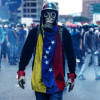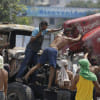Venezuela uses AI anchors to protect journalists from repression

In Venezuela, where the government is reportedly intensifying its crackdown on journalists and protesters, AI-generated news anchors have emerged as a protective measure, offering a way to continue delivering news while keeping human reporters out of harm's way, as per a recent report by The Guardian.
The AI anchors, known as "El Pana" (meaning "friend" in Venezuelan) and "La Chama" ("The Girl"), have become the new faces of independent news in Venezuela. These virtual presenters, created by the Colombia-based organisation Connectas, are designed to look, sound, and move like real people.
They are part of an initiative called "Operation Retweet", which was spearheaded by Connectas director Carlos Huertas. The project's primary goal is to publish news from a dozen independent media outlets in Venezuela while protecting the journalists behind the stories.
"We decided to use artificial intelligence to be the 'face' of the information we're publishing because our colleagues who are still out doing their jobs are facing much more risk," said Huertas in an interview, posted in a recent Reuters report.
As per Reporters Without Borders, since mid-June, at least ten journalists have been arrested, with eight still imprisoned on charges ranging from terrorism to incitement of violence.
By using AI-generated presenters, Connectas aims to circumvent the increasing dangers that journalists face in Venezuela, where being seen on camera could lead to arrest. "Being on camera is no longer so sensible," Huertas noted. Instead, the AI anchors deliver the news, allowing human reporters to avoid direct exposure while ensuring that critical stories about the government's actions reach the public.
According to The Guardian, the AI anchors represent a critical lifeline for Venezuelan journalists who continue to work under the shadow of repression. The opposition and human rights groups have criticised the recent wave of arrests, viewing it as part of a broader effort by the government to silence dissent and suppress news coverage amid a disputed election.

 For all latest news, follow The Daily Star's Google News channel.
For all latest news, follow The Daily Star's Google News channel. 








Comments